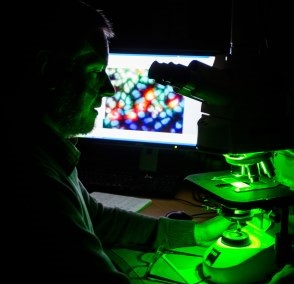

Since 2013, the group has been involved in several areas of research: the development of new antiviral agents against HCV; the study of mechanisms underlying success and failure of these treatments; and HCV resistance to directly acting antiviral drugs. Indeed, resistance has emerged during the HCV therapy revolution, to which the team has greatly contributed. This work has benefited from links with the Hepatology Department, in which clinical trials and cohort studies have been conducted, and the National Reference Center for Viral Hepatitis B, C and Delta, whose members also belong to the research group. A National Observatory of HCV Resistance to Antivirals was created under the responsibility of the group, with the support of the National Agency for Research on AIDS and Viral Hepatitis (ANRS). The group also set up a platform (the only one in France) for the phenotypic characterization of HCV resistance-associated substitutions, using numerous infection models and HCV replicons of various genotypes.
With its experience in the development of anti-HCV drugs, the group is now interested in the search for new broad-spectrum antiviral approaches. The main aim is to provide new treatments for viral diseases frequently associated with high morbidity and mortality and for which there is currently no therapy. The group in collaboration with chemists from the University of Montpellier has discovered a new family of non-peptide small molecule cyclophilin inhibitors. More than 900 compounds of this family have been synthesized and characterized for their anti-cyclophilin activity. Our preliminary experiments indicate that some members of this new family of cyclophilin inhibitors reduce the replication of many viruses of various viral families (Flaviviridae, Coronavirus, respiratory viruses, etc.). We intend to use these compounds to study the mechanisms by which cyclophilins contribute to the cycling of diverse viruses and how they can be blocked for therapeutic purposes. The new family of cyclophilin inhibitors is also under development as putative therapeutic agents.
The group is also exploring the mechanisms underlying the antiviral effect of ribavirin to explore whether and how this molecule could be used to enhance the broad-spectrum antiviral effect of novel cyclophilin inhibitors. Other antiviral targets are being studied in the laboratory, particularly cellular microRNAs (miRs); some miRs are proviral, others antiviral, making it possible to target their effects by using antagomirs or their analogues.
The group has worked for many years on the molecular mechanisms of HCV-induced hepatic and extra-hepatic pathologies. In particular we have studied the mechanisms by which HCV proteins can directly induce the cell dysregulation associated with carcinogenesis and metabolic disturbances related to viral infection. We have, for example, reported how nuclear translocation of the non-structural viral protein 5A (NS5A) in the nucleus activates the transcription of replicating host-cell genes, described the effects of HCV on oxidative DNA damage in humans, and unveiled the mechanisms by which HCV induces insulin resistance and type 2 diabetes.
The group is now elucidating the role of inflammation and immune responses in the hepatic microenvironment of tumors during the genesis and progression of hepatocellular carcinoma. We are specifically characterizing the hepatic microenvironment and its role in the prognosis of HCC and the role of immune control points, as well as that of the cells producing interleukin-17 (T helper 17, Th17) and hepatic macrophage autophagy. These activities are closely related to clinical research activities conducted by other members of the group. They include a pathologist studying the HCC liver microenvironmental and its prognostic value and radiologists developing imaging tools for early diagnosis and prognosis of liver cancers. The overall objective of these studies is the identification of new targets for the development of curative and/or preventive therapies for HCC.